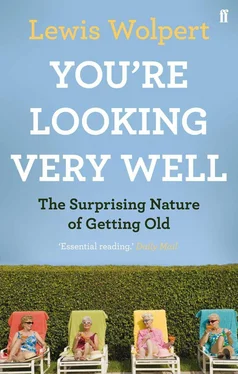A major example of ageism and age discrimination in everyday life in the UK is the mandatory retirement age set at, or after, the age of 65, though the mandatory retirement age for civil servants has been abolished. Early retirement is not necessarily a good thing for an individual. Over 100,000 people were recently forced to retire against their will and this has made life very difficult for many of them. With an estimated 120,000 older workers forced to retire in 2009, this policy is draining billions of pounds from the economy every year. Forcing over 100,000 employees out of the job market has opened up an estimated £ 3.5 billion gap in lost economic output, inclusive of £ 2 billion in lost earnings for the workers themselves. But the government has pledged to get rid of the mandatory retirement age.
A survey in the Economist of articles involving ageing over a recent 10-year period found that most showed a predominantly ageist view of older people as a burden on society, often portraying them as frail non-contributors. Costs of healthcare for old peope are regularly viewed unsustainable and pensions as a demographic ‘time bombs’. Over time small increases in average life expectancy can lead to very large increases in the size of a population, but have also resulted in large gains in economic welfare over the past century; these gains are consequences of improvements in life and health expectancy and are not restricted to a handful of old people.
Work in later life can contribute to older people’s health and wellbeing and can make a dramatic difference financially: ten more years of working life can double the value of a typical private pension. Magistrates and jurors are not allowed to serve past the age of 70, and older workers are rated consistently lower than younger workers, despite no significant differences in work achievements. In fact older workers are actually more reliable in terms of absenteeism than younger workers. The Employment Equality Act (Age) Regulations 2006 has made it unlawful to discriminate in a work or training context against someone because of their age. A worker should not be disadvantaged in any area of employment such as recruitment, employment benefits and dismissal. But there are still crucial exceptions, the main one being that this does not apply to those over 65.
If a task genuinely has to be done by someone who has a particular characteristic related to age, it is currently lawful to discriminate in order to achieve this. An example would be the case of an actor having to play a role of a young character—here there can be discrimination against old actors and a young one can be selected. But it is unlawful for an employer to discriminate against someone because he or she is over 50 unless they can justify their actions, or it is covered by one of the exemptions included in the law. An example of discrimination could be the case of a job applicant aged 60 who has evidence to show that she is better qualified than the person who got the job, who is aged 35, even though the job advert stated that the employer was looking for a ‘junior manager’. The application form had asked for her date of birth. Pay and benefits should be based on skills, and not age.
In the USA the Age Discrimination in Employment Act of 1967 protects individuals who are 40 years of age or older from employment discrimination based on age. It permits employers to favour older workers based on age even when doing so adversely affects a younger worker. An article in the Wall Street Journal claimed that as unemployment intensifies in the economic downturn, claims of age discrimination are soaring. Although mandatory retirement has been abolished in the USA, there are certain types of jobs that do have mandatory retirement laws. These are jobs that are too dangerous for older people or jobs that require particular physical and mental skills. Some of these jobs are those of military personnel, fire fighters, airline pilots and police officers. But retirement is not based on an actual physical evaluation of the person, and this is why many people consider mandatory retirement laws for these jobs to be a form of age discrimination.
Ageism is more than simply having negative attitudes about old age. It can include the following: being refused interest-free credit‚ a new credit card or car insurance because of age; an organisation’s attitude to older people resulting in them receiving a lower quality of service; age limits on benefits such as Disability Living Allowance; a doctor deciding not to refer an old patient to a consultant; losing a job. Age discrimination can involve serious negative treatment that can affect how one lives.
A major biennial survey of over 2‚000 adults run by Age Concern since 2004 exposes the full extent of age discrimination in the UK. It reveals that more than three times more people have been the victims of ageism than any other form of discrimination. Direct discrimination occurs when an employer treats a worker less favourably than other workers on the grounds of age. Three fifths of people aged 65 and over believe older people suffer widespread age discrimination, including in the workplace.
Not surprisingly there was strong support for the Labour minister Harriet Harman’s attack on ageism in a new Equalities Bill which has not been made law, but which advocated ban on age discrimination in provision of goods, facilities, services and public functions. Such a measure could be a milestone in the battle for fairness in later life. But as Age Concern point out,
The Bill only gives ministers the power to ban age discrimination in services if they wish. We want to see an unbreakable legal commitment to introduce new rights, across the public and private sectors. Age discrimination in health and social care services can literally mean the difference between life and death. Because of their age, older people are being denied vital treatments with no legal protection. Each day older people are refused financial products like travel insurance for no better reason than the date on their birth certificate.
Research indicates that most Americans subscribe to at least a mild form of ageism. International Longevity Center-USA found that a majority of older adults reported that they’d been ignored or experienced insensitivity, impatience and condescension from others based solely on their age. The outcome can be more than just an embarrassing situation. Research shows that individuals receiving such treatment often end up with debilitating lowered self-esteem and self-confidence, as well as substandard healthcare. While nearly a third of those in the survey had experienced ageism in the last year, those over 65, and particularly those over 75, were less likely than the rest of the population to view age discrimination as serious.
The former deputy prime minister Lord Heseltine, aged 76, claimed that Britain is becoming an ageist society ‘worshipping at the altar of the young’, and blamed a 24-hour news culture for perpetuating stereotypes about young and old. He said:
To my mind, ‘old’ is first and foremost something mature, ripened and proven, something that has survived time’s test. But I appreciate that society as a whole, and the media especially, does not see it that way.
Rabbi Julia Neuberger believes that in the UK many older people are demeaned and made to feel worthless. It has been suggested that ageism is worse than racism or sexism because there is so little recognition that it is wrong. Discrimination on the basis of age is under-researched compared with racism or sexism; the most serious form of prejudice is considered to be racism, followed by prejudice based on disability.
Abuse of the elderly is the most serious problem of ageism. As many as half a million elderly people in the UK may be being abused, according to a House of Commons report in 2004. It found two thirds of the cases of abuse occur in people’s own homes, and take the form of sexual, physical and financial abuse, neglect and overmedication. Much abuse is not reported because many older people are unable, frightened or embarrassed to report its presence. Often care staff take no action because they lack training in identifying abuse, or are ignorant of the reporting procedures.
Читать дальше












